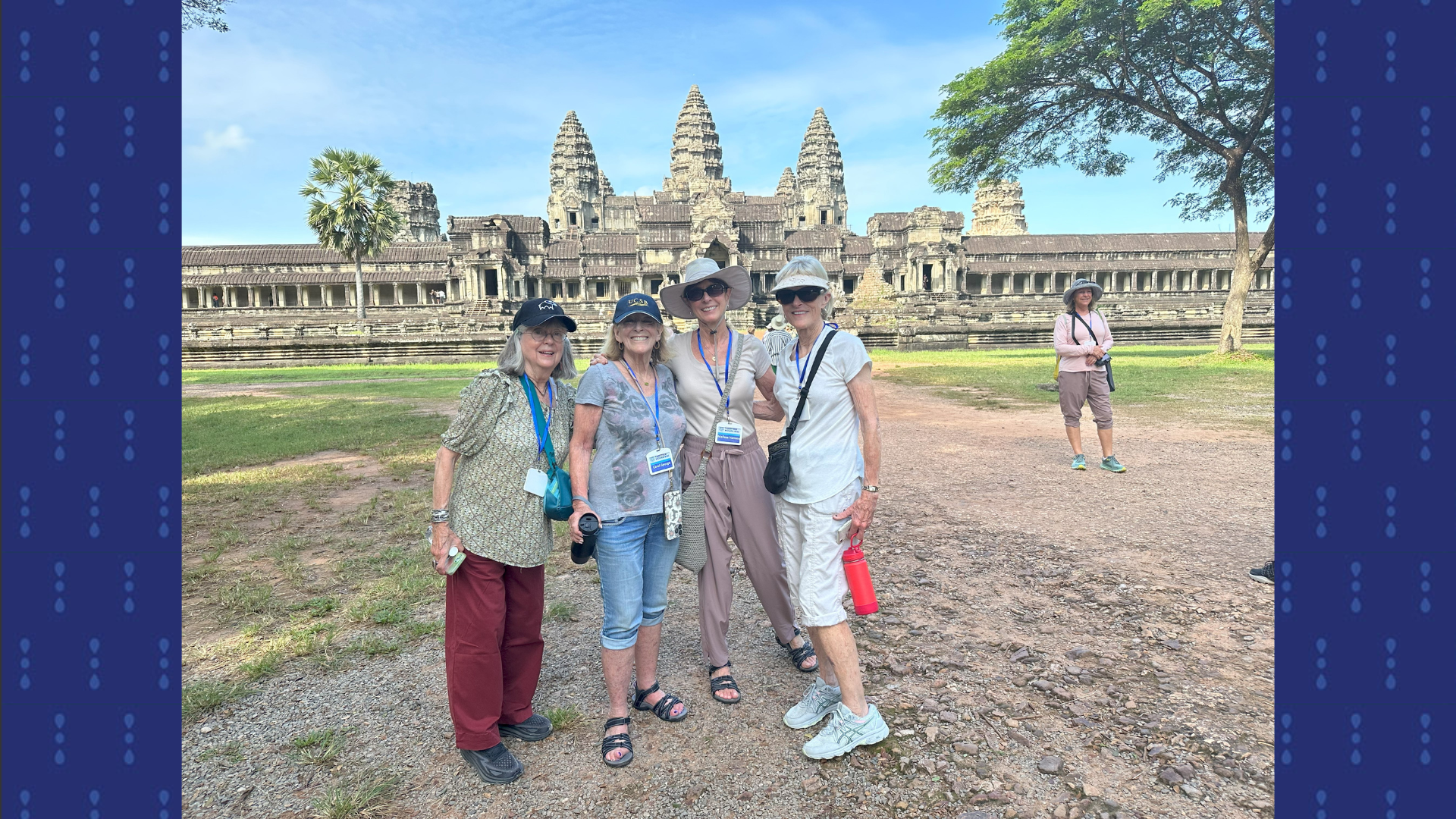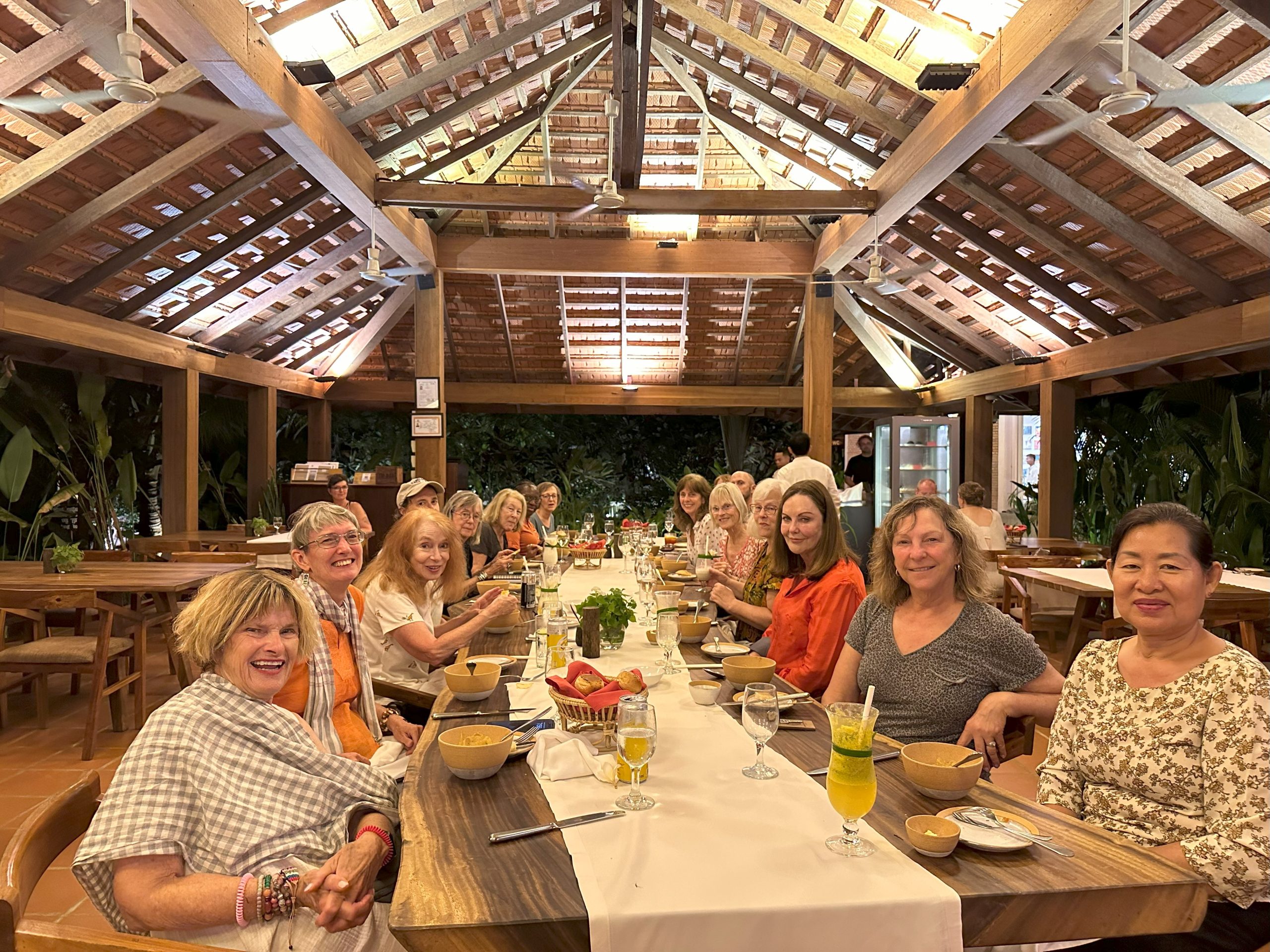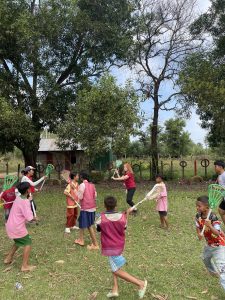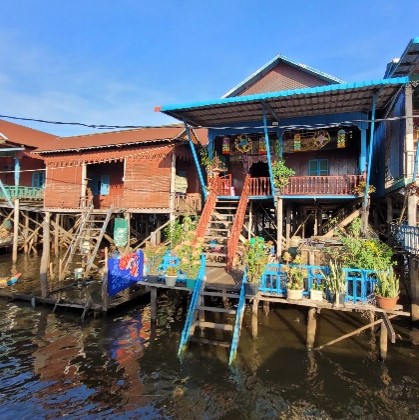
Reflections on Cambodia
By Tessa Hart, Together Women Rise Cambodia Traveler and Member of Elkins Park, PA Chapter
I had the good fortune to travel to Cambodia with 14 other members of Together Women Rise in November 2024. After I got home, everyone asked: “How was your trip?”, typically followed by: “How was the food?” The second question was easy to answer—the food was great—but the first, not so much. Of course, the trip was wonderful, fascinating, fun—but just too complex and special to sum up in a few words. (In fact, I think I’m still working on understanding everything it meant to me.) What were some of the best things about it, that made it such a standout?
Seeing Rise’s commitment in action. Hands down, for me the most meaningful and memorable parts of the trip were visiting two Rise grantees, as well as several stellar non-governmental organizations (NGOs). In the countryside near Siem Reap, Cambodia’s second largest city, we spent part of two days with Kids Play International (KPI), a program embedded in rural primary and secondary schools. Founded in 2014 by Olympic athlete Tracey Evans, KPI uses sports to teach life lessons designed to promote gender equality from an early age, such as how to give opportunities to others; how to think through your actions; and how to play fair in all aspects of life. Far from being passive observers, we joined in the sports (I played lacrosse for the first time in at least 50 years!), participated in discussions with the aid of translators, and danced in the blazing heat to the incredible music of the Medha Women Drummers. This fabulous group is the first female drumming ensemble in the country, having overcome strong resistance to break the long-standing Cambodian taboo against women playing drums.
In the impressive capital, Phnom Penh, we were toured around the city in tuk-tuks by the staff and community partners of Mith Samlanh (“friends” in Khmer). This organization works with international partners to provide comprehensive social services—healthcare, housing, food, vocational training, and trafficking prevention—to children and families affected by extreme poverty. They run a 24/7 hotline by which community members can report potentially problematic situations involving children, and a meticulous data collection process ensures pinpoint tracking of outcomes and impacts. The Mith Samlanh staff put us to work making beads out of scrap paper and whipping up delicious fruit smoothies, to give us a hands-on feel for their work-at-home and restaurant training modules. Their restaurant trainees also served us one of the best meals we had during the entire trip!
 Toward the end of the trip we spent a night at the Farmhouse Resort, where we luxuriated in spa treatments and jacuzzi pools in a beautiful countryside setting. But the real story was behind the scenes: this resort doubles as a working farm (including a fish farm), a school and music center, and a sophisticated woodshop, all to provide opportunity and enrichment to the surrounding communities.
Toward the end of the trip we spent a night at the Farmhouse Resort, where we luxuriated in spa treatments and jacuzzi pools in a beautiful countryside setting. But the real story was behind the scenes: this resort doubles as a working farm (including a fish farm), a school and music center, and a sophisticated woodshop, all to provide opportunity and enrichment to the surrounding communities.
These opportunities to engage with community-based projects were priceless—to my mind, the #1 reason to take a Rise trip. But there are plenty of others:
A deep dive into history and culture. The trip organizers left plenty of time to explore Cambodia’s grand—and tragic—history. We toured magnificent temples, including the famous Angkor Wat; saw a performance of traditional Cambodian dances; viewed ancient sculptures in the National Museum; and joined an urban throng to view boat races during the annual Water Festival celebrating the end of the monsoon season. We threaded through crowded marketplaces and shopped in a village whose inhabitants create beautiful silver jewelry and ornaments. On a boat trip to Tonlé Sap, the largest freshwater lake in Southeast Asia, we marveled at the famous Floating Villages—the name is self-explanatory.
We also spent a somber day learning about the genocide during the reign of the notorious Khmer Rouge, 1975-1979, and silently honoring its victims. In just two years, up to 3 million people were killed—between one-quarter and one-third of Cambodia’s population. Leaders and educated people were especially targeted, sending the nation on a downward spiral from which it’s still working to recover. One of our Cambodian guides, Thida, was 8 years old when the killing started, and she relayed the harrowing story of her family’s escape and ultimate survival. Thida walked us through the Tuol Sleng Genocide Museum and the Killing Fields of Cheung Ek, which the Cambodian government has turned into a heart-wrenching memorial.
Fun and fellowship. Needless to say perhaps, it was a rare treat to share these experiences with like-minded women from around the US. We experienced random surprises like a live fish leaping out of its container in a crowded market, a monkey sipping from a water bottle in a parking lot, a tree full of flying foxes in the urban bustle of Phnom Penh. As we got to know one another, we developed a playful and adventurous group spirit. On the last full day of the trip, we belted out karaoke on the bus returning from the Farmhouse to Phnom Penh. We sang with verve and without embarrassment, although in my case, a little restraint might have been wise.
Perspective. Visiting a country in the Global South, especially when you have a chance to dig deeper than the typical tourist, brings into sharp focus just how privileged we are. For me and others in the group, this trip reaffirmed our commitment to do as much as we can to lift up our sisters (and brothers) in other parts of the world. In Cambodia, which is a Buddhist country, I felt an atmosphere of gentleness and acceptance that seems increasingly rare in the US. Since coming home, I have been reflecting on how to instill more of this peaceful perspective into my own life: in my interactions with others, and in my attitudes toward outside events that are beyond my control.
Click HERE to learn more about Together Women Rise’s Travel Program and its future trips. In 2025, three trips are being offered: the Dominican Republic in March (this trip is now full), Rwanda in June, and Indonesia in September. Space on these trips is limited so register early to ensure your spot.


